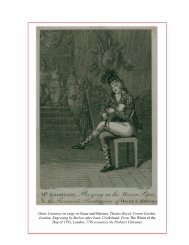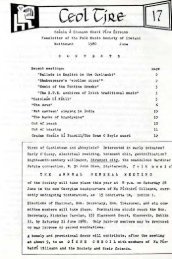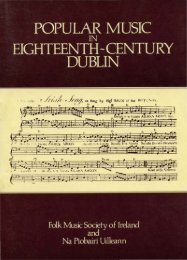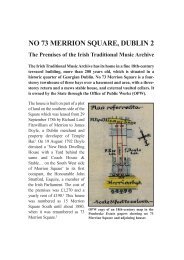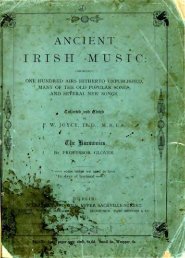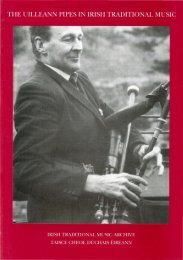Union Pipes - Irish Traditional Music Archive
Union Pipes - Irish Traditional Music Archive
Union Pipes - Irish Traditional Music Archive
You also want an ePaper? Increase the reach of your titles
YUMPU automatically turns print PDFs into web optimized ePapers that Google loves.
COUrTney’S ‘UnIOn PIPeS’ AnD The TerMInOlOgy OF IrISh BellOWS-BlOWn BAgPIPeS 16<br />
In 1766 a blind professional musician Mr James Mullin had come<br />
from london to Derby to perform ‘Several extraordinary Pieces of<br />
<strong>Music</strong> on the <strong>Irish</strong> Bagpipes, german flute and Violin’. 37 The Scot<br />
James Tytler, editor in edinburgh of the second edition of the<br />
Encyclopaedia Britannica, played on the ‘<strong>Irish</strong> pipes’ according to<br />
his friend the poet robert Burns, 38 and Tytler would have been speaking<br />
from personal experience when he also applies this term to the<br />
instrument in 1778, and describes it in the encyclopaedia as the ‘softest,<br />
and in some respects the most melodious of any’ bagpipes. 39<br />
From about 1765 to the end of the century london and other musical<br />
instrument sellers are regularly advertising two kinds of bagpipes –<br />
‘Bagpipes, Scotch or <strong>Irish</strong>’ – for sale, 40 and some claim to be making<br />
them. 41 By 1779, less than a decade before Courtney appears in london,<br />
notes… By this, their Chanter has the most of the Flute Compass’. If the<br />
contemporary <strong>Irish</strong> pipes he refers to were more ‘variegated’ or varied than these,<br />
they would have had a range comparable to that of geoghegan’s ‘new or pastoral’<br />
instrument, and probably, like it, have had a capability for producing various semitones<br />
by crossfingering. They may even have been geoghegan’s instrument; he<br />
was <strong>Irish</strong>, and it is an open question whether his pipes were seen as <strong>Irish</strong> in<br />
Scotland in 1760. By ‘other <strong>Music</strong>k’ MacDonald doubtless meant the kind of popular<br />
classical music he had just been writing about, by such composers as Corelli,<br />
Festing and handel.<br />
37<br />
Derby Mercury, Derby, 19 Sept. 1766.<br />
38<br />
r.h. Cromeck, Reliques of Robert Burns, quoted in Stewart 2009: 79.<br />
39<br />
[Tytler] 1778: 954.<br />
40<br />
See halfpenny 1964: 100–101 for a 1765 robert Bremner advertisement; Bath<br />
Chronicle and Weekly Gazette, Bath, 17 Aug. 1769, for a Thomas Underwood<br />
advertisement; Gazeteer and New Daily Advertiser, london, 13 June 1770, for a<br />
henry Thorowgood advertisement; and A Catalogue of Vocal and Instrumental<br />
<strong>Music</strong>... for a John Welcker advertisement [c. 1775]; etc.<br />
41<br />
John Welcker [c. 1775] for example: ‘John Welcker... Manufactures and Sells the<br />
following Instruments... Bagpipes Scotch or <strong>Irish</strong>... Bagpipe [reeds]...’ (in catalogue<br />
of note 40). Welcker lists so many instruments of his manufacture that it might be<br />
suspected that he is factoring them for other manufacturers, but he also gives a separate<br />
list of instruments that he only imports (including ‘Welch harps’ and ‘<strong>Irish</strong> harps’).



